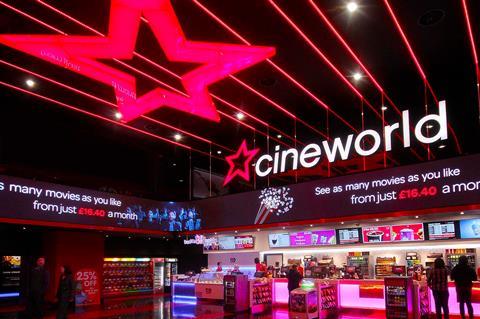
When Cineworld filed for Chapter 11 bankruptcy protection in September, the exhibitor drew heavily on industry parlance in its first‑day presentation to the Texas court.
The document began with a ‘Storyboard’: the ‘Cast and Crew’ were then listed, including CEO Mooky Greidinger, deputy CEO Israel Greidinger and the senior management team. The ‘Opening’ detailed Cineworld’s corporate history, charting how grandfather Moshe laid the firm’s foundations with the opening of the Ein Dor cinema in Israel in 1930. A section titled ‘The Plot Twist’ then spelt out how Covid brought the world’s second-biggest exhibitor to its knees, while ‘The Action’ listed some of the measures Cineworld had taken to deal with the fallout.
Cineworld’s road to the Texas court began with heavy borrowing to fund its growth. The company loaded up on debt to fund the acquisition of cinema chains such as the US’s Regal Cinemas and the UK’s Picturehouse, helping it to amass more than 9,000 screens in 10 countries. Its debts were reported at $5.2bn on June 30, 2022, not counting lease liabilities.
The company’s finances were devastated by Covid, which closed theatres, delayed major film releases and accelerated the shift to streaming. Revenues fell from $4.4bn in 2019 to $1.8bn in 2021, while group adjusted EBITDA fell from $1bn to $455m. It meant Cineworld was fast running out of money to pay its debts.
A $959m court judgment against Cineworld for pulling out of a deal to buy Canada’s Cineplex chain — which Cineworld is appealing — only added to the exhibitor’s liabilities.
Cineworld blames film production and release delays as well as a weak 2022 film slate for disruption this year, leading to its liquidity crisis. When the company filed for Chapter 11, it had less than $4m in cash across its global operations.
The Chapter 11 process will see Cineworld try to reduce debt and improve its balance sheet, effectively by transferring ownership from its equity investors including the Greidinger family (who own about 20% of Cineworld), to its lenders.
The lenders will take control, swapping debt for equity. Cineworld itself says the process “will result in very significant dilution of existing equity interests in the Group.”
Many of the landlords from whom Cineworld leases its cinemas will also likely see their rents reduced. As part of the restructuring process, the exhibitor said it intended to hold “collaborative discussions” with US landlords to improve its lease terms.
The Chapter 11 process should be reassuring to Cineworld suppliers, including the distributors who supply it with films. Chapter 11 is a highly structured and open process that aims to reorganise a company’s balance sheet and to ensure it has enough money to operate.
Lender determination
Cineworld has enough money to see it through the process. It went into Chapter 11 with $1.94bn of debtor-in-possession (DIP) financing from some of its lenders to help fund its operations and to refinance some of its debt incurred during Covid. This means Cineworld’s lenders have lent it even more money to ensure the company can still operate. It is understood that the DIP facility is the fifth-largest ever agreed in the US, a sign of the determination of Cineworld’s lenders to support the business.
Companies that file for Chapter 11 also benefit from an ‘automatic stay’, which keeps aggressive creditors at bay and prevents them calling in loans or repossessing property. This allows Cineworld to prioritise paying key suppliers, vendors and staff.
Continuing with day-to-day business as normal is very much in the interests of both Cineworld and its lenders. “They want to make sure they do not hurt the business,” says one debt restructuring expert. “Key for creditors is to make sure they don’t kill the goose, whether it lays golden or silver eggs.”
The expert adds: “You are trying to say to staff and trade creditors, ‘Don’t worry, this is just a financial problem — we’ll continue to pay you.’” Thanks to Cineworld’s DIP facility, the company has immediate access to funds.
In the medium to long term, the company’s creditors will be hoping admissions improve, boosting its income and balance sheet. At this point, Cineworld’s lenders will start to look for an exit plan — likely within three to five years.
Future leadership
There are now question marks over the future of the Greidingers at Cineworld. The Chapter 11 process typically takes nine months to resolve. At that point, will Cineworld’s lenders – who will own the business – want Mooky to continue at the helm? That depends on whether he is perceived by creditors as the best man to run the business and to maximise the creditors’ recoveries.
Mooky has been criticised for loading the company up with debt and leading the company into bankruptcy proceedings. “In fairness to Mooky, yes he went on an acquisition spree before Covid and built a cinema empire with lots of borrowed money,” says the restructuring source. “But people were very happy to lend him the money to do that. And I don’t think we can blame him for what happened with Covid.”
Some think it is likely Mooky – who is known to live and breathe the cinema business - will be given a stake in the restructured company.
Others have speculated Cineworld may be sold as it emerges from Chapter 11. But a buyer would either need a big cheque book or would have to borrow a lot of money – at a time when interest rates are high.
In the meantime, there are some likely winners from the restructuring. Chapter 11 is a notoriously expensive process, and is likely to cost Cineworld tens of millions of dollars – much of which will go on lawyers.















![[L-R]: Amanda Villavieja, Laia Casanovas, Yasmina Praderas](https://d1nslcd7m2225b.cloudfront.net/Pictures/274x183/6/4/1/1471641_pxl_20251224_103354743_618426_crop.jpg)








![[L-R]: Amanda Villavieja, Laia Casanovas, Yasmina Praderas](https://d1nslcd7m2225b.cloudfront.net/Pictures/100x67/6/4/1/1471641_pxl_20251224_103354743_618426_crop.jpg)
No comments yet